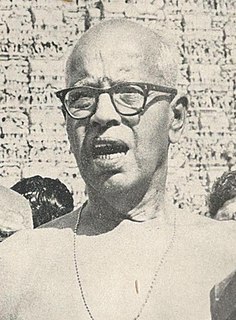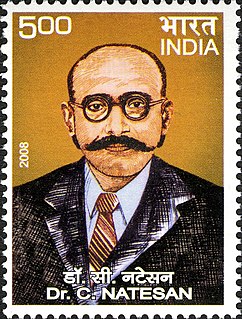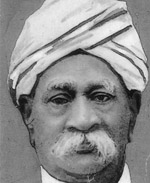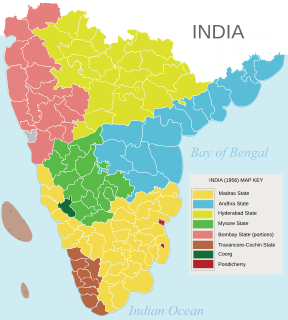Related Research Articles

The Dravida Munnetra Kazhagam is a political party based in the state of Tamil Nadu where it is currently the full-majority ruling party and the union territory of Puducherry where it is currently the main opposition.
The Justice Party, officially the South Indian Liberal Federation, was a political party in the Madras Presidency of British India. It was established on 20 November 1916 in Victoria Public Hall in Madras by Dr C. Natesa Mudaliar and co-founded by T. M. Nair, P. Theagaraya Chetty and Alamelu Mangai Thayarammal as a result of a series of non-Brahmin conferences and meetings in the presidency. Communal division between Brahmins and non-Brahmins began in the presidency during the late-19th and early-20th century, mainly due to caste prejudices and disproportionate Brahminical representation in government jobs. The Justice Party's foundation marked the culmination of several efforts to establish an organisation to represent the non-Brahmins in Madras and is seen as the start of the Dravidian Movement.

Dravidar Kazhagam is a social movement founded by Periyar E. V. Ramasamy, also called Thanthai Periyar. Its original goals were to eradicate the ills of the existing caste system including untouchability and on a grander scale to obtain a "Dravida Nadu" from the Madras Presidency. Dravidar Kazhagam would in turn give birth to many other political parties including Dravida Munnetra Kazhagam and later the All India Anna Dravida Munnetra Kazhagam.

Seshadri Srinivasa Iyengar CIE, also seen as Sreenivasa Iyengar and Srinivasa Ayyangar, was an Indian lawyer, freedom-fighter and politician from the Indian National Congress. Iyengar was the Advocate-General of Madras Presidency from 1916 to 1920. He also served as a member of the bar council from 1912 to 1920, the law member of Madras Presidency from 1916 to 1920 and as the president of the madras province Swarajya Party faction of the Indian National Congress from 1923 to 1930. Srinivasa Iyengar was the son-in-law of renowned lawyer and first Indian Advocate-general of Madras, Sir Vembaukum Bhashyam Aiyangar. Iyengar's followers called him Lion of the South.

Paramasiva Subbarayan was an Indian politician, freedom fighter and diplomat and was the Chief Minister of Madras Presidency, India's ambassador to Indonesia and Union Minister of Transport and Communications in Jawaharlal Nehru's government. He was the father of General P. P. Kumaramangalam who served as India's Chief of Army staff and politician Mohan Kumaramangalam. He was also the grandfather of INC and BJP politician and Union Minister Rangarajan Kumaramangalam.

Sir Ponnambala Thiaga Rajan was the Chief Minister of Madras Presidency from 4 April 1936, to 24 August 1936. He was also the last President of the Justice Party. P. T. Rajan was born in a Thondaimandala mudaliar family in Uthamapalayam. His ancestors were from Kanchipuram. He attended The Leys School, Cambridge and later, Jesus College, Oxford. He graduated in history and law, and practiced as an advocate for some time before joining the Justice Party.
The anti-Hindi-imposition agitations of Tamil Nadu were a series of agitations that happened in the Indian state of Tamil Nadu during both pre- and post-independence periods. The agitations involved several mass protests, riots, student and political movements in Tamil Nadu concerning the official status of Hindi in the state.
Dravida Nadu is the name of a proposed sovereign state demanded by Justice Party led by the founder of self respect movement Thanthai Periyar and the Dravida Munnetra Kazhagam (DMK) led by C. N. Annadurai for the speakers of the Dravidian languages in South India.

Diwan Bahadur Agaram Subbarayalu Reddiar was a landlord and Chief Minister or Premier of Madras Presidency from 17 December 1920 to 11 July 1921.
Dravidian parties include an array of regional political parties in the state of Tamil Nadu, India, which trace their origins and ideologies either directly or indirectly to the Justice party and the Dravidian movement of C. Natesanar and Periyar E. V. Ramasamy. The Dravidian movement was based on the linguistic divide in India, where most of the Northern Indian, Eastern Indian and Western Indian languages are classified as Indo-Aryan, whereas the South Indian languages are classified as Dravidian. Dravidian politics has developed by associating itself to the Dravidian community. The original goal of Dravidian politics was to achieve social equality, but it later championed the cause of ending the domination of North India over the politics and economy of the South Indian province known as Madras Presidency.

Erode Venkatappa Ramasamy, revered as Periyar or Thanthai Periyar, was an Indian social activist and politician who started the Self-Respect Movement and Dravidar Kazhagam. He is known as the 'Father of the Dravidian movement'. He rebelled against Brahminical dominance and gender and caste inequality in Tamil Nadu. Since 2021, the Indian state of Tamil Nadu celebrates his birth anniversary as 'Social Justice Day'.

P. Kakkan or fondly known as Kakkanji, was an Indian politician and freedom fighter who served as a member of the Constituent Assembly of India, Member of Parliament, President of the Tamil Nadu Congress Committee and in various ministerial posts in Congress governments in the erstwhile Madras state between 1957 and 1967.

Dr. C. Natesa Mudaliar (1875–1937), also known as Natesan, was an Indian politician and activist of the Dravidian Movement from the Indian state of Tamil Nadu. He was one of the founders of the Justice Party, along with P. Theagaraya Chetty and Dr. T. M. Nair. He is often mentioned as Dravida Thanthai.

The first legislative assembly Election to the Madras state based on universal adult suffrage was held in March 1952. This was the first election held in Madras state after the Indian Independence. This election was officially known as the 1951 Madras State Election, even though through delays, actual voting didn't take place until early 1952.

Rao Bahadur Namasivayam Sivaraj was an Indian lawyer, politician and Scheduled Caste activist from the state of Tamil Nadu.

The first legislative council election to Madras Presidency after the establishment of dyarchical system of government by the Government of India Act, 1919, was held in November 1920. Indian National Congress boycotted the election due to its participation in the Non-cooperation movement. The election occurred during the early stages of non-Brahmin movement and the major issue of the election was anti-Brahminism. Justice party won the election with no significant opposition and A. Subbarayalu Reddiar became the first Chief Minister of the presidency.
The Anti-Hindi imposition agitation of 1937–40 is a series of protests that happened in Madras Presidency of the British Raj during 1937-40. It was launched in 1937 in opposition to the introduction of compulsory teaching of Hindi in the schools of the presidency by the Indian National Congress government led by C. Rajagopalachari (Rajaji). This move was immediately opposed by E. V. Ramasamy (Periyar) and the opposition Justice Party. The agitation, which lasted three years, was multifaceted and involved fasts, conferences, marches, picketing and protests. The government responded with a crackdown resulting in the death of two protesters and the arrest of 1,198 persons including women and children. The mandatory Hindi education was later withdrawn by the British Governor of Madras Lord Erskine in February 1940 after the resignation of the Congress government in 1939.

The Self-Respect Movement is a movement, started in South India, with the aim of achieving a society in which oppressed castes have equal human rights, and encouraging backward castes to have self-respect in the context of a caste-based society that considered them to be a lower end of the hierarchy. It was founded in 1925 by S. Ramanathan who invited E. V. Ramasamy to head the movement in Tamil Nadu, India against Brahminism. The movement was extremely influential not just in Tamil Nadu, but also overseas in countries with large Tamil populations, such as Malaysia and Singapore. Among Singapore Indians, groups like the Tamil Reform Association, and leaders such as Thamizhavel G. Sarangapani were prominent in promoting the principles of the Self-Respect Movement among the local Tamil population through schools and publications.

Madras State was a state of India during the mid-20th century. At the time of its formation in 1950, it included the whole of present-day Tamil Nadu, Coastal Andhra, Rayalaseema, the Malabar region of North and central Kerala, Bellary, South Canara and Kollegal. Coastal Andhra and Rayalaseema were separated to form Andhra State in 1953, while South Canara and Bellary districts alongwith the Kollegalam taluka of Coimbatore district were merged with Mysore State, and Malabar District with the State of Travancore-Cochin to form Kerala in 1956. Post State Reorganization in 1956, the remaining Madras State was renamed to Tamil Nadu, meaning "Tamil country" on January 14, 1969.
The Dravidian movement in British India started with the formation of the Justice Party on 20 November 1916 in Victoria Public Hall in Madras by C. Natesa Mudaliar along with T. M. Nair and P. Theagaraya Chetty as a result of a series of non-Brahmin conferences and meetings in the presidency. Communal division between Brahmins and non-Brahmins began in the presidency during the late-19th and early-20th century, mainly due to caste prejudices and disproportionate Brahminical representation in government jobs. The Justice Party's foundation marked the culmination of several efforts to establish an organisation to represent the non-Brahmins in Madras Presidency.
References
- ↑ Kavitha Muralidharan (20 November 2016). "100 years of Justice Party, a movement which defined Tamil Nadu politics". The NewsMinute. Retrieved 13 September 2021.
- ↑ Philomena Royappa Reddy, P. Sumangala (1998). Women in Development: Perspectives from Selected States of India. B.R. Publishing Corporation. p. 129. ISBN 9788170189787.
- ↑ Vadivelu Rajalakshmi (1985). The Political Behaviour of Women in Tamil Nadu. Inter-India Publications. p. 82. ISBN 9788121000208.
- ↑ K Vijaya (1993). "Role of Women in Self-Respect Movement". Indian History Congress. 54: 594. JSTOR 44143032.